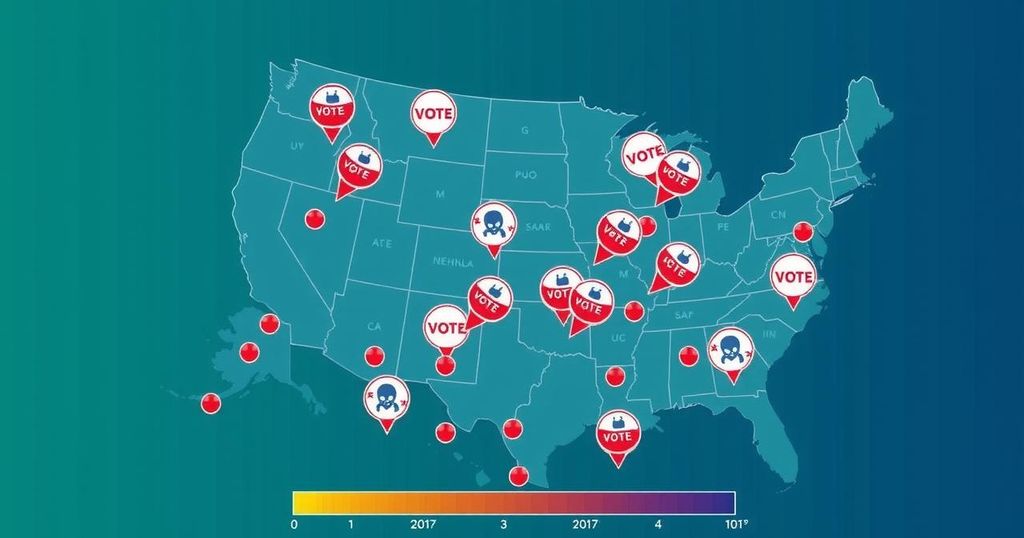Washington State Voters Fixate on Presidential Race as Elections Approach

As Washington state approaches a pivotal election, voters prioritize the presidential race between Kamala Harris and Donald Trump over local contests, reflecting anxiety and hope about national politics. Local elections are not forgotten but are overshadowed by the emotional weight of the presidential campaign as various voter demographics express distinct concerns and sentiments regarding the future of the country.
Washington state is preparing to elect a new governor for the first time in twelve years, along with appointing a new attorney general and potentially several new members of Congress. Voters will also consider four statewide initiatives that could drastically affect taxation and the state budget while threatening ambitious climate goals. Contrary to the significance of these local races, interviews with local voters reveal that the presidential election contest between Vice President Kamala Harris and former President Donald Trump is singularly commanding their focus. This sentiment persists despite the fact that the presidential election will likely not be decided in Washington, where the outcome may merely reinforce established voting patterns. The overwhelming attention on the presidential race manifests in feelings of apprehension and excitement, especially concerning Trump’s polarizing reputation. Voter David Phillips articulated a common viewpoint, expressing concern over Trump’s rhetoric, describing it as “terrifying, terrifying rhetoric.” Phillips and many others feel compelled to prioritize national politics over local matters. In turn, local candidates have adapted their campaigns to resonate with voters’ anxieties, often referencing the presidential race to harness relevance in a hyper-competitive environment. Bob Ferguson, the Democratic gubernatorial candidate, has notably used ads to juxtapose his opponent, Dave Reichert, with Trump, indicating a strategic effort to align with the national narrative. In traditionally conservative areas, voters express divided sentiments about the election’s impact on their lives, with some indicating a shift towards Democratic ideals, particularly in suburban regions that were previously competitive. Voter opinions vary broadly, with some, like Sandy Robinson, acknowledging traditional values but leaning towards a specific candidate as a lesser evil in a climate of uncertainty. Others, like Chuck Lysen, critique the leadership styles of both candidates, emphasizing character over policy. Throughout Washington, there is a diverse mix of opinions influenced by national politics, with some voters expressing dissatisfaction with perceived failures of the current administration. Jodie Bosma, for instance, has raised concerns about safety and immigration issues under the incumbent government, while others like Sean Wrigley indicate curiosity about Harris’s potential but lean towards Trump out of familiarity. Amidst this backdrop, the process of voting remains integral to many, reinforcing a commitment to civic duty, illustrated by Mike Kenna, who actively engages in facilitating the voting process. His remarks reflect the widespread tensions in electoral integrity discussions sparked by Trump’s claims regarding mail-in voting. As millions of ballots have been cast across the nation, early statistics show Washington experiencing a decline in voter turnout from previous elections, contributing to a palpable sense of anxiety amongst voters as they head toward Election Day. In summary, while Washington voters are set to engage in various local elections, the national contest between Harris and Trump fully occupies the public’s consciousness, demonstrating the complexities and frustrations of the electoral process amidst an emotionally charged political environment.
The article focuses on the upcoming elections in Washington state, particularly emphasizing the unprecedented political engagement surrounding the presidential race compared to local elections. Historically, Washington has seen shifts in voter demographics, with many regions transitioning from Republican to Democratic leaning, especially in suburban areas. The narrative highlights how national political conflicts overshadow local issues, creating a landscape of fear and uncertainty among voters as they approach Election Day, reflecting broader national trends and tensions.
In conclusion, the focus on the presidential race overshadows local elections in Washington, reflecting a broader trend of national political dynamics impacting individual voter concerns. Many voters express anxiety over the implications of a Trump presidency, while local candidates find it crucial to align their messages with the overarching narratives of national contests. The upcoming elections underscore the blending of local and national priorities, illustrating how voter sentiments may shape outcomes far beyond individual state lines.
Original Source: www.seattletimes.com







